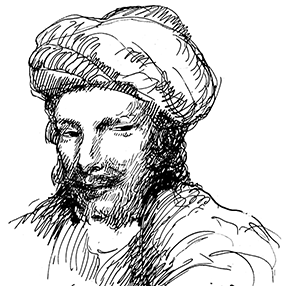O Málik! I pray thee go for the wine full early,
And if it be dear to buy, then buy it dearly!
Bethink thee how once a grizzled old tavern-keeper,
Whose whiskers were black with blowing the tarry wineskin,
I called, as he lay where slumber had stolen o’er him —
His head sunk low, the left hand’s palm his pillow;
And he at my cry arose with a start of terror,
And hastened to light the wick, and it flared, and straightway
His terror was flown: he had gotten a look of gladness
And gaily haha’d—a clatter of idle laughter.
When now by the flame my features were lit, he gave me
The greeting of love, asked many a courteous question;
And into his hand I counted a thousand dirhems
To lodge me a month, with freedom for either party.
I found in his pleasure-domes two noble virgins
Of family high and proud, and became their bridegroom.
’Tis thus I have ever lived and am living ever,
Away my religion goes and my wealth in armfuls.
As oft as we meet, I like what the law forbiddeth,
And never can bear to like what the law hath hallowed.
This poem is in the public domain. Published in Poem-a-Day on April 7, 2024, by the Academy of American Poets.
“[O Málik! I pray thee go for the wine full early]” is a poem featured in the anthology Translations of Eastern Poetry and Prose, edited by Reynold A. Nicholson (Cambridge University Press, 1922). Nicholson reflects on Nuwas’s work, stating, “In his wine-songs, he portrays with an art almost Greek in its ease and directness not only himself, as he lived from day to day, but the luxury and debauchery prevailing at the court of Baghdad, where Persian manners had become fashionable. He often ridicules the conventions of Bedouin love-poetry and the rude monotony of life in the desert […]. Although he treated moral laws and religious observances with contempt, his [Diwan] includes some edifying poems on asceticism. Perhaps these were composed in moods of disgust and disillusion. One who was cynically frank in describing his own vices is unlikely to have assumed a virtue which he did not feel.” In Abu Nuwas: A Genius of Poetry (Simon and Schuster, 2012), Philip F. Kennedy, professor of Middle Eastern and Islamic studies and comparative literature at New York University, also notes, “Abu Nuwas perfected two Arabic genres: the wine poem and the hunting poem. But he is remembered mainly for the former, with its erotic (often homosexual) elements, and especially for the licentiousness associated with it. His wine poetry and erotic poetry were by any standards singularly inventive; and when we add to them the remarkable sting of his invective verse he is not unjustly compared to the Earl of Rochester [John Wilmot] whose venomous yet somehow elegant poetic duels with poets of the court of Charles II are quite the apt measure of Abu Nuwas’s Arabic for the Anglophone reader.”

